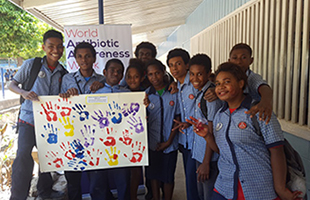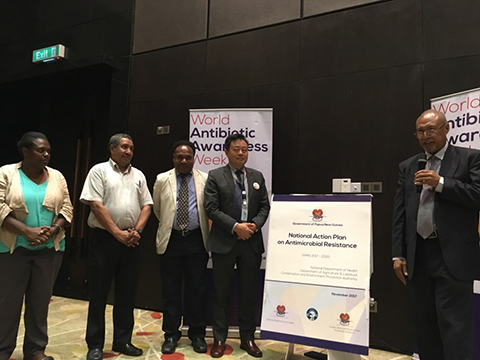
Students in Port Moresby signify their commitment to be guardians of antibiotics through their handprints in celebration of Antibiotic Awareness Week.
The world has responded too late and too slow. In Papua New Guinea, we should respond to Antimicrobial resistance like it is an emergency,” said PNG’s Minister for Health and HIV/AIDS, Sir Puka Temu.
Antimicrobial resistance (AMR) is the ability of microorganisms (such as bacteria) to withstand antimicrobials (such as antibiotics) to which they were originally sensitive. As a result, the medicines become ineffective and infections persist in the body, increasing the risk of spread to others. Every year, more than 700,000 deaths around the world are attributed to AMR. In recognition of the global public health impact of AMR, the World Health Organization (WHO) has urged governments to take urgent concerted action to combat it.
In response to this call, the National Department of Health (NDOH) took the lead in drafting the National Action Plan on Antimicrobial Resistance 2017-2020, together with the Department of Agriculture and Livestock and the Department of Environment and Conservation and with technical assistance from WHO. This important document was launched during a ceremony held in Port Moresby on 20 November 2017. In the said event, the Country Situation Analysis was presented. Messages were delivered by the Health Secretary Pascoe Kase, and Director of Conservation and Environment Protection Authority, Manino Virobo.
The Health Minister, Dr Temu, said as the misuse of antimicrobials accelerates development of AMR, no antibiotic should be dispensed without prescription. He urged all stakeholders to continue working together and commit to the National Action Plan so the country continues to benefit from antibiotics for a long time.
WHO Representative to Papua New Guinea, Dr Luo Dapeng, said that AMR is not purely a health issue but also an economic and security issue. This only highlights the need for multi-sector, inter-agency cooperation – a One Health Approach. “Antibiotics are the most precious resource of the health system, and we all should do what it takes to preserve them – for us, for our children, and for our children’s children”, said Dr Luo.
Since 2015, Papua New Guinea joined the international community in celebrating the World Antibiotic Awareness Week (WAAW). This year, with support from WHO, the NDOH Pharmaceutical Services Standards Branch staged various activities from 13 to 17 November 2017. Campaigns to educate people about the harms of AMR and what can be done to combat it included distribution of IEC materials to clinics and health facilities in the National Capital District and provinces. School-based awareness programs were run at Kopkop College and Carr Memorial School where all participants took their pledge to be guardians of antibiotics.

